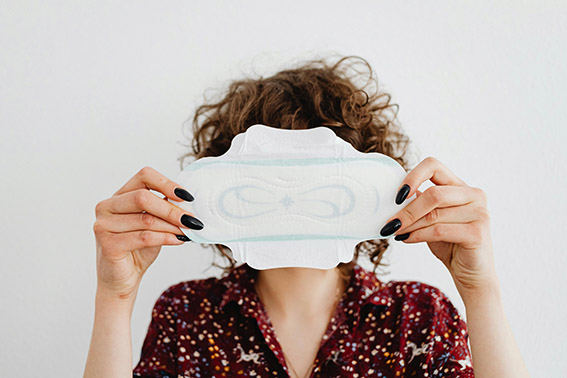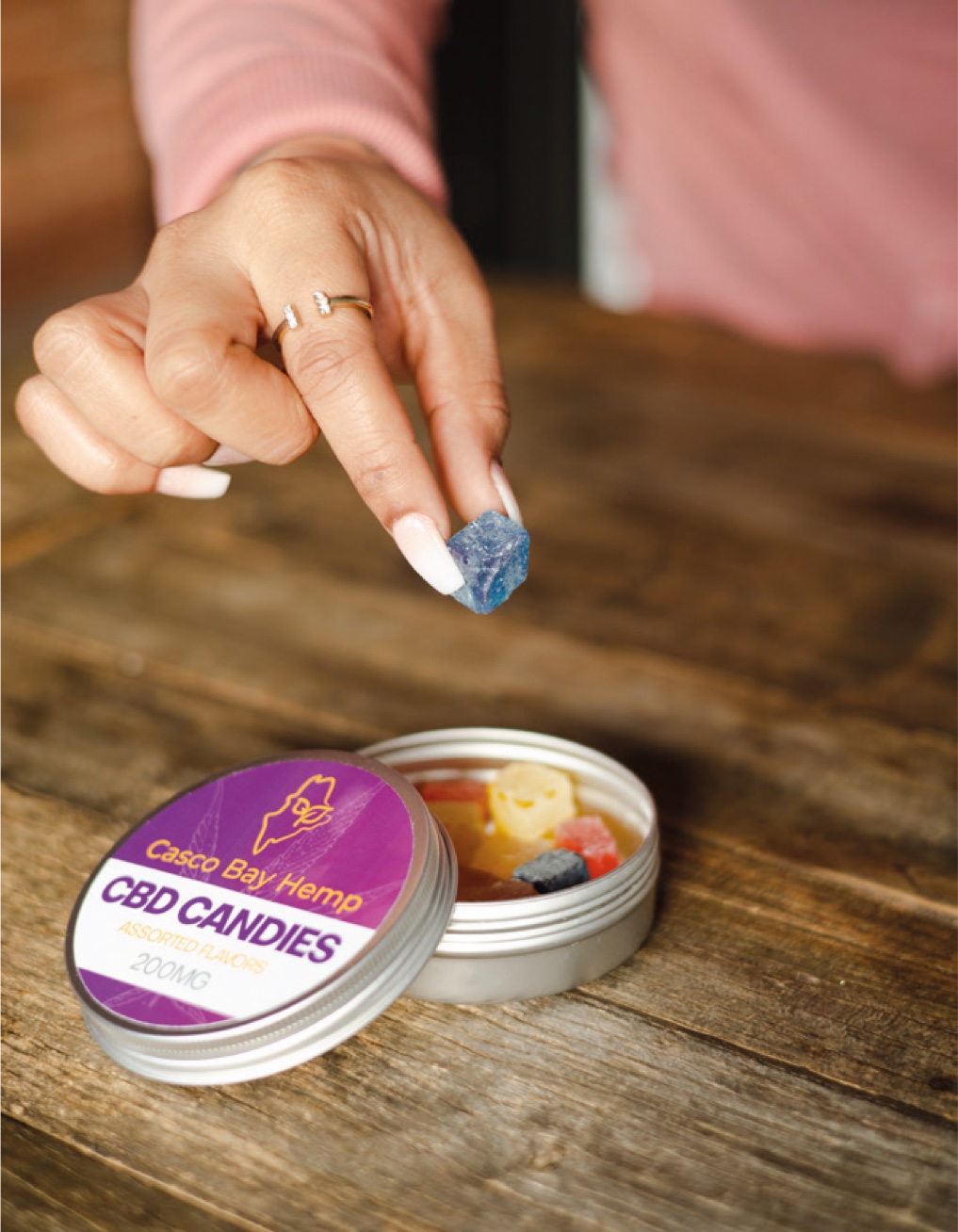COLUMN: CONSUMER PERSPECTIVE
Menopause stigma and its
impact on wellness choices
KEYWORDS —
Menopause stigma,
Wellness products,
Aging and menopause,
Consumer behavior,
Women’s health.
Abstract
Studies of major depressive disorder have been correlated with reduced Lactobacillus and Bifidobacteria and symptom severity has been correlated to changes in Firmicutes, Actinobacteria, and Bacteriodes. Gut microbiota that contain more butyrate producers have been correlated with improved quality of life (1).
A study in healthy women providing probiotic yogurt for four weeks showed an improvement in emotional responses as measured by brain scans (2). A subsequent study by Mohammadi et al. (3) investigated the impacts of probiotic yogurt and probiotic capsules over 6 weeks and found a significant improvement in depression-anxiety-stress scores in subjects taking the specific strains of probiotics contained in the yogurt or capsules. Other studies with probiotics have indicated improvements in depression scores, anxiety, postpartum depression and mood rating in an elderly population (4-7).
Other studies have indicated a benefit of probiotic supplementation in alleviating symptoms of stress. In particular, researchers have looked at stress in students as they prepared for exams, while also evaluating other health indicators such as flu and cold symptoms (1). In healthy people, there is an indication that probiotic supplementation may help to maintain memory function under conditions of acute stress.
“
“A study in healthy women providing probiotic yogurt for four weeks showed an improvement in emotional responses as measured by brain scans”
Even though we live in a world of oversharing our lives on social media and increasingly progressive attitudes, the topic of menopause remains one of the last taboos, even as the aging population grows. Despite societal shifts toward openness about health and wellness, the conversation around menopause is still largely avoided, particularly in public and professional settings. This silence perpetuates the notion that menopause is something to be hidden or endured privately. Women navigating this life stage often fear being seen as “old” or “less capable,” especially in environments that prioritize youth and productivity. As a result, discussing menopause openly can feel uncomfortable or even risky.
A recent UK study of 5,399 participants found that while awareness of menopause in the workplace is increasing, most women still don’t disclose their status or have access to information. Through an online survey of 5,399 participants, it explored three main areas: personal experiences with menopause, whether women disclosed their menopause status at work, and the availability of workplace information on menopause. Results showed that 43.4% of participants were perimenopausal, while 16.8% were postmenopausal. However, less than half (45.8%) had disclosed their menopause status at work, and only 20% had access to menopause-related information at their workplace, although most expressed a desire for it. The findings highlight that while awareness is growing, more support and resources are needed to ensure women going through menopause feel supported in their professional environments.
A study analyzing 440 Instagram posts tagged with #menopause revealed that social media discussions about the menopause transition often focus on themes like weight loss, fitness, and hormones, which are not heavily represented in biomedical literature. The research found that while there is some overlap in topics like hot flashes, many prevalent themes in social media do not align with formal research. This suggests a need for more comprehensive studies that address the real experiences and support needs of individuals going through menopause, as social media reflects diverse concerns that may be overlooked in academic discussions.
This reluctance and misalignment has significant implications for understanding consumer behavior around wellness products geared towards menopausal and perimenopausal consumers. The stigma surrounding menopause often leads women to avoid seeking out products specifically designed to support their transition, opting instead for general wellness or anti-aging solutions that feel less conspicuous. This hesitance limits their access to effective products that could improve their well-being. By sidestepping menopause-specific wellness solutions, many women forgo the relief these targeted products offer, impacting their overall health and quality of life. For brands and R&D teams, this represents both a challenge and an opportunity to develop products that can break through the stigma and offer discreet yet effective solutions for menopause management.

PRIORITIZING PRIVACY: HOW STIGMA SHAPES PRODUCT DESIGN AND SHOPPING BEHAVIOR
A qualitative study examined perceptions of women experiencing negative menopausal symptoms in the workplace. Utilizing a hybrid vignette-story completion technique, researchers gathered insights from 48 employees in a UK organization about their thoughts on a hypothetical woman, Julie, disclosing her symptoms to either a male or female manager. The analysis revealed four key themes: the burden of menopause, managing menopause at work, the perception that menopause does not belong in the workplace, and the potential for menopause to unlock new life opportunities. This study sheds light on the social and cultural understandings that shape perceptions of menopausal women, highlighting the need for support.
The stigma surrounding menopause significantly influences consumer preferences, especially in terms of product design and branding. Many women seek out products that do not openly signal their association with menopause, preferring subtle or neutral packaging that doesn’t draw attention to their purchase. This preference is often driven by a desire to maintain privacy and avoid the judgment or embarrassment they fear might come from using products explicitly marketed for menopause relief. As a result, brands developing menopause wellness solutions may need to carefully consider their approach to branding, opting for designs that are understated and versatile, without overt references to menopause.
By adopting more neutral or wellness-focused messaging, companies can create products that appeal to women who wish to discreetly manage their symptoms without feeling self-conscious. For example, using terms like “hormonal balance” or “life-stage wellness” instead of directly referencing menopause can help brands engage consumers who want effective solutions but are hesitant to embrace products that explicitly target menopause. This shift toward subtlety in branding ensures that women feel comfortable purchasing and using these products, supporting their health while respecting their desire for privacy.
The growing demand for discretion has also fueled the rise of e-commerce as a preferred shopping avenue for menopause wellness products. Many consumers feel uneasy about purchasing these items in traditional brick-and-mortar stores, where they may fear being judged or exposed. Online shopping provides a private and convenient alternative, allowing consumers to explore and purchase menopause products from the comfort of their homes, without the anxiety that may come with public exposure.
E-commerce platforms offer a unique advantage in providing anonymity, giving women the freedom to research and compare products without feeling self-conscious. Digital platforms can also provide more personalized recommendations based on browsing behavior, which adds value to the shopping experience without the pressure of interacting with a sales associate. Brands offering menopause-related products online can take advantage of this by ensuring their websites and digital channels create a welcoming, informative, and private environment for consumers. By offering tailored content, easy product navigation, and educational resources, companies can address the needs of women seeking discreet solutions, ultimately fostering greater trust and engagement in this underserved market.
When privacy is a priority for consumers navigating menopause, the combination of subtle product design and the convenience of e-commerce offers brands a pathway to better meet the needs of this group. Emphasizing privacy, discretion, and ease of access can help break down barriers, allowing consumers to confidently embrace products that improve their wellness.



Innovating for Wellness: Product Development in the Era of Millenopause
A recent report by Carrot Fertility, featured on KYW News, highlights that millennial women in the workforce are breaking the silence around menopause, with 51% already thinking about it regularly and many actively preparing for its impact on their careers. This marks a generational shift, as millennials are more likely to engage in conversations about menopause and explore treatment options like hormone replacement therapy (HRT), which has been stigmatized in the past. Millennials are also more proactive in advocating for workplace benefits and support, seeing menopause management as a key factor in job satisfaction and career longevity. This evolving attitude signals that the next generation is ready to take action on menopause both in the workplace and in broader social contexts, making it a critical issue for employers, and even product developers and marketers, to address.
As the conversation around menopause evolves, so too does the approach to product development aimed at supporting women during this transition. Millennial women, who are increasingly aware and informed about menopause, present a unique opportunity for brands to innovate in ways that resonate with their values and needs. Enter, “Millenopause”. Millennials, now 72 million strong, represent America’s largest living generation, with many in their early 40s. This demographic shift means a significant portion is approaching menopause, with some already experiencing perimenopause, which can start as early as age 35.
This generation's proactive attitude towards understanding menopause drives the demand for products that are not only effective but also aligned with their lifestyles and preferences:
Consumer-Centric Product Design: One of the most significant recent shifts in product development is the focus on consumer-centric design. Millennial women are seeking products that address their specific menopause symptoms—such as hot flashes, mood swings, and sleep disturbances. For instance, supplements, skincare, and fitness products can be developed with formulations tailored to menopause, effectively meeting the demands of women who want solutions that cater to their unique experiences.
Demand for Transparency and Information: Transparency is a cornerstone driver of millennial consumer behavior, valuing detailed information about product ingredients and their effectiveness, and preferring brands that prioritize clear communication and education. In response, companies should invest in transparent marketing strategies that not only promote their products but also educate consumers about how these solutions can help alleviate menopause-related symptoms. Brands that successfully provide this information will build trust and foster loyalty among millennial consumers.
Subtle Branding and Discreet Packaging: Millennial women often prefer discreet branding and packaging that avoids overt references to menopause. This trend opens the door for creative innovation in product design, allowing brands to utilize neutral labeling that communicates efficacy without reinforcing stigma. By adopting a more subtle approach, brands can make menopause wellness products more appealing to consumers who desire discretion in their purchasing decisions.
The Role of Technology in Menopause Management: The integration of technology into menopause management is another area ripe for innovation. As digital natives, millennial women are more inclined to leverage technology to track their symptoms and access wellness resources. Brands can seize this opportunity by developing apps or wearables that offer personalized insights, symptom tracking, and access to educational content. Such solutions empower women to take control of their menopause journey, making informed decisions about their health and wellness.
Focus on Holistic Wellness Solutions: There is a growing trend among millennials toward holistic wellness solutions that consider physical, mental, and emotional health. Product developers should explore ways to create comprehensive offerings that address menopause symptoms while promoting overall well-being. This could include products that integrate nutritional support with mental health resources, thereby aligning with millennials' preference for a balanced and healthy lifestyle.
Inclusivity in Research and Development: Finally, inclusivity in research practices is essential for developing products that truly meet the diverse needs of all women experiencing menopause. By incorporating varied perspectives and experiences into the research and development process, brands can ensure their products are effective and relevant across different demographics. This approach will not only enhance product efficacy but also foster a sense of belonging among consumers, reinforcing that their experiences matter.


A New Era in Menopause Wellness
We are entering a transformative era in menopause wellness, driven by the millennial generation's engagement with their menopause experiences. As these women seek effective solutions to manage symptoms, brands have a significant opportunity to innovate and create products that align with their values, preferences, and lifestyles.
For market success, companies must understand the concerns that women face—such as embarrassment and the desire for privacy—and develop products that resonate with both their experiences and consumer journey. With a focus on consumer-centric design, technological integration, holistic wellness, community support, and inclusivity, the industry can pave the way for a new era of menopause wellness that empowers women and effectively addresses their needs. Brands that innovate thoughtfully can become catalysts for change. The future of menopause wellness hinges on creating products that empower women while helping to normalize conversations around this significant life transition.

Studies of major depressive disorder have been correlated with reduced Lactobacillus and Bifidobacteria and symptom severity has been correlated to changes in Firmicutes, Actinobacteria, and Bacteriodes. Gut microbiota that contain more butyrate producers have been correlated with improved quality of life (1).
A study in healthy women providing probiotic yogurt for four weeks showed an improvement in emotional responses as measured by brain scans (2). A subsequent study by Mohammadi et al. (3) investigated the impacts of probiotic yogurt and probiotic capsules over 6 weeks and found a significant improvement in depression-anxiety-stress scores in subjects taking the specific strains of probiotics contained in the yogurt or capsules. Other studies with probiotics have indicated improvements in depression scores, anxiety, postpartum depression and mood rating in an elderly population (4-7).
Other studies have indicated a benefit of probiotic supplementation in alleviating symptoms of stress. In particular, researchers have looked at stress in students as they prepared for exams, while also evaluating other health indicators such as flu and cold symptoms (1). In healthy people, there is an indication that probiotic supplementation may help to maintain memory function under conditions of acute stress.
References and notes
- Arseneau, M. E., Backonja, U., Litchman, M. L., Karimanfard, R., Sheng, X., & Taylor-Swanson, L. (2021). # Menopause on Instagram: a mixed-methods study. Menopause, 28(4), 391-399. https://pubmed.ncbi.nlm.nih.gov/33399318/
- Beck, V., Brewis, J., & Davies, A. (2020). The remains of the taboo: experiences, attitudes, and knowledge about menopause in the workplace. Climacteric, 23(2), 158-164. https://pubmed.ncbi.nlm.nih.gov/31533494/
- Chatzopoulou, E., & de Kiewiet, A. (2021). Millennials' evaluation of corporate social responsibility: The wants and needs of the largest and most ethical generation. Journal of Consumer Behaviour, 20(3), 521-534. https://onlinelibrary.wiley.com/doi/full/10.1002/cb.1882
- Daly, K. L., Pike, G., Clarke, V., & Beck, V. (2024). “Difficulty mentioning the M word”: Perceptions of a woman disclosing negative menopause symptoms in the workplace. Qualitative Research in Organizations and Management: An International Journal. https://eurekamag.com/research/093/816/093816955.php?srsltid=AfmBOoq6RucHxF6lv0QR4aH6jcd3zytuUFSSwmip8NRXbKnEqZb_KAYm
- Leake, L. (2024, July 8). Menopause stigma is impeding women’s career growth, survey says. Here’s how a lack of support is hampering ambition—and the economy. Fortune. Retrieved from https://fortune.com/well/article/menopause-stigma-survey-women-workplace-ageism/
- Lindsey, H. (2024, September 12). Women are demanding better menopause care. Online platforms are heeding the call. Business Insider. Retrieved from https://www.businessinsider.com/menopause-startups-research-gain-traction-in-womens-healthcare-2024-9
- Hurwitz, C. (2024, April 8). Millenopause: Millennials, meet menopause. Oprah Daily. Retrieved from https://www.oprahdaily.com/life/health/a60179755/what-is-millenopause/
- New Report Reveals Millennial Workers are More Informed Than Ever About Menopause's Impact on Their Careers -- and They're Ready to Take Action. (2024,September 30). PRNewswire. Retrieved from https://www.prnewswire.com/news-releases/new-report-reveals-millennial-workers-are-more-informed-than-ever-about-menopauses-impact-on-their-careers--and-theyre-ready-to-take-action-302262052.html
- Shree, S.S., Milano, A. (2024, May 30). Unveiling Perimenopause—A Call to Action for Millennial Women. Newsweek. Retrieved from https://www.newsweek.com/unveiling-perimenopause-call-action-millennial-women-opinion-1905922
- Sobel, T., Derakshani, D., & Vencill, J. A. (2024). Menopause experiences in sexual minority women and non-binary people. Maturitas, 108007. https://pubmed.ncbi.nlm.nih.gov/38677174/

